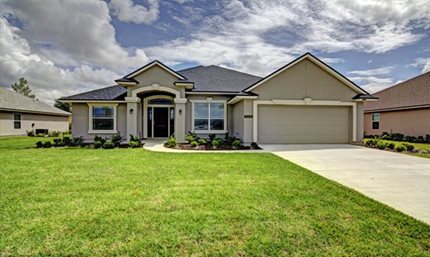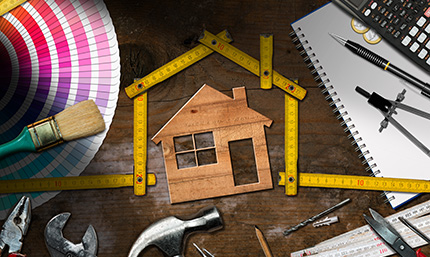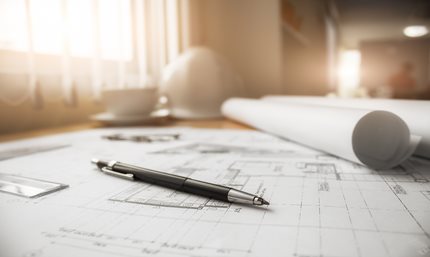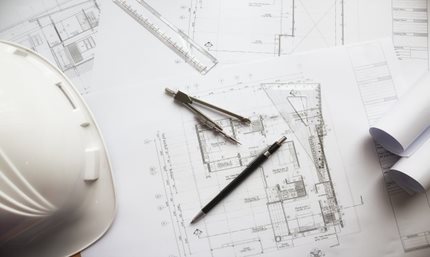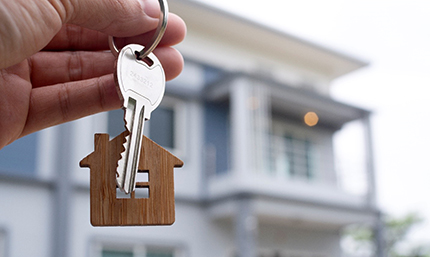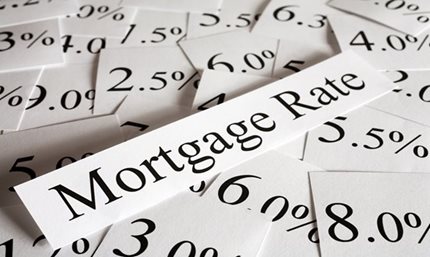News & Tips
Is it Hard to Get a Construction Loan? Your Questions Answered

For many, getting a construction loan can sound complicated and overwhelming. However, building a home that allows for personalization from the ground up can be a dream come true. And it can be an attractive option to avoid the race to find a home and dealing with negotiation battles in markets that have a tight inventory. You may have lots of questions when it comes to getting a construction loan, and we’d like to help lessen your stress. With some knowledge under your belt, you’ll be well on your way to breaking ground, picking out from swatches, and getting those keys.
Ready to get started with building your dream home? Apply for a construction loan at SCCU today!
How do construction loans work?
A construction loan is typically a short-term loan (a year or less) where the lender pays the contractor in phases once certain milestones are completed. Most construction loans cover the cost of the land, labor, materials, and permits. You may also request the loan to cover permanent fixtures, such as appliances and landscaping.
The borrower usually makes interest-only payments to the lender until the construction is completed. It’s important to note that because the monthly payments for the construction will vary every month, so will the amount of the interest payments.
With a construction-to-permanent loan, the lender will convert the construction loan into a mortgage once the construction and inspections are complete and the certificate of occupancy has been received.
However, with construction-only loans, which are also called “standalone construction loans,” borrowers must paying the loan in full upon completion. If you’d like to learn more, you can see our guide to construction loans here.
Note: Most lenders won’t issue construction loans to do-it-yourselfers. Lenders will require that developers meet certain qualifications to ensure they complete the project on time. If you’re a licensed builder by trade, however, then it may be possible to get an owner-builder construction loan.
What is the interest rate on a construction loan?
Construction loan interest rates vary based on the term, the lender, and the borrower’s creditworthiness. Plus, they also fluctuate based on the prime lending rate. They’re usually higher than home mortgage loans, but don’t let that deter you from getting one. Credit unions will typically offer lower interest rates for construction loans.
You can view all the current construction rates at SCCU here:
| Term | Rate "As Low As" | APR* "As Low As" | Example Loan Amount | Example Monthly Payment |
|---|---|---|---|---|
| 10 Years | 5.625% | 5.828% | $300,000 | $3,274.40 |
| 15 Years | 5.750% | 5.893% | $300,000 | $2,491.23 |
| 15 Years Jumbo | 5.875% | 5.951% | $850,000 | $7,115.51 |
| 20 Years | 6.500% | 6.617% | $300,000 | $2,236.72 |
| 30 Years | 6.500% | 6.589% | $300,000 | $1,896.20 |
| 30 Years Jumbo | 6.625% | 6.672% | $850,000 | $5,442.64 |
Example monthly payments do not include taxes and insurance, and the actual payment obligation will be greater.
Rates based on creditworthiness. SCCU construction loans are construction-to-permanent loans, with a 12-month construction period. Once construction is complete, final inspection has cleared, and certificate of occupancy (CO) has been received, the loan automatically converts from construction to the permanent loan that the member selected prior to beginning construction. If construction extends past the 12-month initial period, the rate lock will expire and the rate will be reset at the higher of current rate or the initial lock-in rate. SCCU may agree to make an exception and extend the construction phase of the loan. Any such extension may result in changes in to the rate, payment amounts, and closing costs.
During construction phase, SCCU makes payments to the builder at certain key points during construction. During this period, member loan payments are interest-only, based on the total amount of money that has been advanced by SCCU to the builder. The payments to the builder are contingent upon passing required inspections. During this phase, the interest-only payments will vary monthly, depending upon the total amount paid to the builder at the time of each payment calculation. Payment examples above are given for the permanent phase of the loan only and do not include the interest-only construction phase payments. At initial closing, SCCU collects $1,400 to cover the costs of inspections and builder disbursement. Any funds remaining after CO is issued will be refunded to the member. If actual disbursement charges are greater than $1,400, the member will not be charged above the initial $1,400.
Jumbo Loans available on loans greater than $832,750.
Taxes and insurance not included, your actual payment obligation will be higher.
How much are closing costs on a construction loan?
Construction-to-permanent loans: Sometimes called “single-close loans,” they typically only require the borrower to pay one set of closing costs. This way, you can avoid the hassle of submitting documents twice and paying additional fees. Plus, many borrowers like to lock in their mortgage rates early.
At SCCU, we offer a No Closing Costs option for construction loans, which comes with some restrictions. For our conventional construction loans, we collect $1,400 at the initial closing to cover inspection costs. SCCU will refund the borrower any remaining funds after the final closing. If additional funds are necessary, the borrower won’t have to pay past the $1,400.
Construction-only loan: If a borrower chooses to get this type of loan and then a separate mortgage loan, this allows them to find the best terms for each type of loan. Some like this option because they can also enjoy more flexibility with making changes during the building phase. However, this also means they will need to submit documents twice and pay closing costs twice.
What are the construction loan requirements?
Construction loan requirements will vary by type and lender. Because there isn’t a house to use as collateral, lenders will often need to see more documentation and require higher qualifications from the borrower. In most cases, the borrower will need to have a credit score of 680 or higher, a debt-to-income ratio of 45% or lower, sufficient income, and a down payment of at least 20% or more. You can learn more about pulling your paperwork and calculating your debt-to-income ratio in our online Home Buying Center.
Lenders may also want the borrower to present them with a builder contract, building plans, a prepaid homeowner’s insurance policy, detailed estimates to buy the house, and an estimated home appraisal. In addition, the lender may need specific documents from the builder, such as their work history and insurance. Ultimately, having a plan in place helps minimize the risk for the lender, and it will help you get preapproved for the loan.
- Can a first time home buyer get a construction loan? They sure can! As long as the first time home buyer meets the requirements and can pay the down payment, lenders will still usually issue them a construction loan.
- Can you get a construction loan without a down payment? Whether or not a down payment is a requirement depends on the type of loan. With VA and USDA loans, qualified borrowers can get a construction loan with 0% down. For FHA loans, the down payment could be as low as 3.5% down. Some lenders will issue traditional construction loans with 10% down. Lenders who offer construction loans with zero to low down payments can be difficult to find, and they may have stricter criteria.
Can a construction loan be used for renovations?
Yes, you can get a construction loan for substantial renovations. Keep in mind that you’ll typically need to show the lender that you’ll be adding value to the house. You’ll also be on a construction timeline with a draw schedule.
However, if you’re looking for more freedom with how you use the funds, your budget, plan, and payments, there are other options available. These options typically are easier to qualify for.
For renovations under $20,000, these may be a better fit for your projects:
- Personal loans: Personal loans are often easier to secure, and they usually have better terms and a fixed interest rate. You can see SCCU’s personal loans here.
- Credit cards: Many home improvement stores will issue credit cards with higher credit lines for projects. While you can qualify for a credit card with a fair credit score, the interest rates are often higher.
For both personal loans and credit cards, it’s a good idea to set up a payment plan beforehand to ensure that you’re making payments on time and not hurting your credit score.
For renovations above $25,000, and for those with sufficient equity in their home, you may like the following options more:
- Cash-out refinance: With a cash-out refinance, you can refinance your first mortgage and take out your home’s equity in cash.
- Second mortgage: You can also look at a home equity loan, which often has a fixed rate, or you could consider a home equity line of credit (HELOC), which often has a variable rate.
How to Apply for a Construction Loan
It can be quite the journey to build your dream home, but for many, it’s worth it. If you’d rather not go it alone with a construction loan, it can be helpful to hire a construction loan broker to help you navigate the requirements and facilitate the process. They can help you find a good builder and gather everything you need to get approved for a loan. If you’d like to forge your own path, here’s a snapshot of how to apply for a construction loan:
- Shop around for a licensed builder: It’s a good idea to get quotes from multiple builders. Be sure to ask friends or family for recommendations and look at ratings/reviews from past clients. You’ll need a plan in place that involves the blueprints, materials, timelines, and site options. Be sure to ask about what shortage issues they’re facing and alternative options for those items.
- Do your homework with lenders: Once you have a contract in hand with your builder, talk to multiple lenders about the maximum amount they’ll loan, their rates, and requirements for credit score, income, and debt-to-income ratio. Learn more about how to pick the right lender for your dream home here.
- Gather documentation and get preapproved: Next, make sure you have everything you need to apply for the construction loan with the lender. This includes identification documents and proof of income.
Why consider a credit union like SCCU for a construction loan?
At SCCU, we offer construction-to-permanent loans with terms up to 30 years, competitive interest rates with a guarantee18, one application, fast pre-approval decisions, one closing, one paperwork filing, up to 90% financing available16, and Member Service for the life of the loan. Plus, we can make exceptions and extend the construction phase if necessary, especially due to shortage issues.
Unlike banks that put shareholders first, we’re a co-operative institution that puts our members’ interests first. We also provide personalized service for our members. We stand by our promise: Honest People. Trusted Products. Time Valued. If you have any questions about construction loans, feel free to get in touch with us and one of our Team Members will be happy to help.






